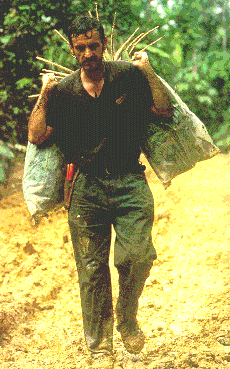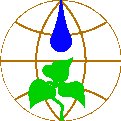 ...............
...............
The Parker-Gentry Fellowship was established by an anonymous donor in 1994 to honor the memory of two of the New World tropic's leading scientists, Theodore A. Parker III and Alwyn H. Gentry, who died in a tragic plane accident in Ecuador on August 3, 1993. At the time of the accident, Ted and Al were surveying possible boundaries for a new forest reserve in Ecuador as members of Conservation International's Rapid Assessment Program (RAP). The death of these two outstanding biologists created a tremendous hole in tropical research and biodiversity conservation during a time when research and policy action are so imperative. The intent of this fellowship is to recognize and honor Ted and Al's committment to training by providing research opportunities to Latin American scientists.
Ted Parker, senior scientist at Conservation International, was widely recognized as the most knowledgeable ornithologist of the Neotropics. His contribution to our understanding of the region's avifauna went far beyond his tremendous skills at identifying birds by sight and sound. In addition, Ted was a great natural historian and an impassioned spokesperson for conservation of the flora and fauna of the region. Ted's concerns for conservation were instrumental in his vision and development of the Rapid Assessment Program of Conservation International.
Al Gentry, senior curator at the Missouri Botanical Garden, was unmatched in his ability to identify Neotropical plants and his contributions to herbaria and the botanical and ecological literature were immense. His book, A Field Guide to Woody Plants of Northwest South America, published just shortly before his death, is an invaluable source of information for students of the region's flora and will likely remain the single most important volume of the region's flora for many decades to come.
Both Ted and Al were magnets for students of tropical biology. Each of them recognized the importance of training the next generation and each gave so freely of their time and knowledge. Almost without exception, they were accompained on their field trips to South and Central America by local scientists. The intent of the Parquer-Gentry Tropical Research Fellowship is to provide opportunities for students of tropical biology and conservation to conduct research leading to an advance degree. Conditions for elegibility are current enrollment in the graduate program in Biology at the University of Missouri-St. Louis, and a project in one of the following countries - Bolivia, Brazil, Colombia, Costa Rica, Ecuador, Guatemala, Guyana, Honduras, Nicaragua, or Peru. Latin American students have been targeted in recognition of Ted and Al's research in and fondness for neotropical countries. Research monies from the Parker-Gentry Tropical Research Fellowship are to be used for expenses associated with field research in these countries. Application materials are available from the International Center for Tropical Ecology at the University of Missouri-St. Louis.
Since the inception of the fellowship in their names, 5 students have received fellowship support. These fellowships have clearly impacted the careers of these young scientists. In every case, the award of this prestigious and highly competitive research fellowship has contributed to their success with external granting agencies, including four National Science Foundation Dissertation Improvement grants, and research grants from Wildlife Conservation Society, BirdLife International, Sigma Xi, American Museum of Natural History, American Ornithologists' Union, among others. Our first recipient, Luis Miguel Renjifo, recently defended his dissertation and has accepted a position as the Director of Conservation Biology Program at the Humboldt Institute in Colombia. This institute works directly with the Minsitry of Environment, and Dr. Renjifo will literally be setting the biodiversity and conservation agenda for this megadiversity country. Jaqueline Goerck is expected to complete her PhD in the next year, and will return to Brazil to assist in her country's conservation efforts. All of our present recipients knew Ted and Al personally and receiving the Fellowship has meant a great deal to them personally. Let us share with you some of the students' own words:
"...I will never be so satisfied as the day I was notified that I would receive the Parker-Gentry award...[these] two persons marked an indelible route, a route that is made of their effort, knowledge, sincerity, and their unselfish interest for humanity....the minimum one can do as a recipient of such a prize is to give the best effort as a scientist and as a person to reach not only the personal realization but also to contribute with one's work to conserve our natural environments."
"Knowing Ted Parker and Al Gentry was one of the most gratifying experiences I have had as a biologist. I can only hope that their prominence is recognized in generations to come.."
"It has been an honor to receive this fellowship given in the name of two of the most knowledgeable field biologists that I had the fortune to know in the field, as well as personally. Ted and Al were revered by students in Latin America, and their contagious enthusiasm for the tropics changed the lives of so many of us."
The Neotropics harbor much of the world's biodiversity, yet our understanding of the biota and complexity of tropical ecosystems is still very incomplete. Ted and Al's research form much of the core of what we know about the Neotropics today. Given the knowledge that still needs to ber gathered and the urgency with which we must work in order to conserve the region's diverse ecosystems before they disappear forever, we hope that the Parker-Gentry Tropical Research Fellowship will be instrumental in fostering the next generation of tropical biologists.
 ...............
...............
